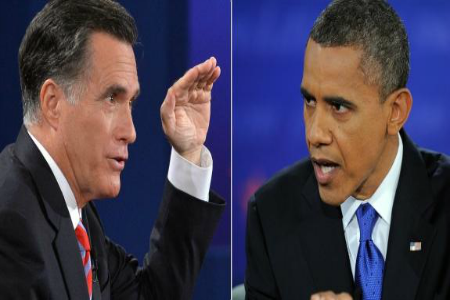
(The Root) — The tweet by Fox News contributor Kirsten Powers said it best: “Whoever did Obama’s debate prep should get a raise.” While the first presidential debate was a clear win for former Massachusetts Gov. Mitt Romney and the second debate was widely seen as a slim win for President Barack Obama, the third and final debate, which focused on foreign policy, brought a clear win for President Obama.
The president dominated the debate from the outset, attacking Romney immediately with this barb: “And, you know, Gov. Romney, I’m glad that you agree that we have been successful in going after al-Qaida, but I have to tell you that, you know, your strategy previously has been one that has been all over the map and is not designed to keep Americans safe or to build on the opportunities that exist in the Middle East.” That was the first of many blows the president landed.
He delivered a number of zingers that captivated cyberspace before the debate had even concluded, among them this: “I think Gov. Romney maybe hasn’t spent enough time looking at how our military works. You mentioned the Navy, for example, and that we have fewer ships than we did in 1916. Well, Governor, we also have fewer horses and bayonets, because the nature of our military’s changed. We have these things called aircraft carriers, where planes land on them. We have these ships that go underwater, nuclear submarines.”
This attack resulted in “bayonets” being among the most searched Google terms of the night immediately following the debate, according to Howard Kurtz of the Daily Beast. It also spawned a number of satirical images, including this one of a mock Romney-Ryan campaign poster featuring bayonet wielding civil war re-enactors. Another image depicted Big Bird wielding a bayonet, a combination of two of the Obama campaign’s most memorable attacks in recent weeks. (Big Bird emerged as one of the stars of the first presidential debate.)
There were times when Romney appeared so out of his element with the foreign policy focus that occasionally it was hard not to recall Alaska Gov. Sarah Palin’s performance in 2008. According to the book Game Change, which chronicled the 2008 presidential election and has been called accurate by senior McCain advisers, Palin memorized a series of lines for her debate against then-Sen. Joe Biden. She was instructed to “pivot” back to domestic issues within her comfort zone if she was asked about something she was not confident in discussing.
Time after time, Romney similarly attempted to pivot during last night’s debate. While both he and the president seemed more interested in discussing the economy at times — the defining issue of the election for most voters — the governor’s clumsy and insistent attempts at pivoting back toward domestic policy made it appear that he knew he couldn’t go toe-to-toe with the president on foreign policy, and therefore wasn’t going to try.
In light of last week’s thwarted terror attack on the Federal Reserve, which, had it been successful, could have potentially rivaled 9/11, it is possible that foreign affairs could be more in the forefront of voters’ minds than usual. Yet it is still unlikely the president’s stellar performance in the final debate will matter all that much on Election Day. The reason? In part because not as many viewers are likely to have watched this debate as they did the first or the second. The third presidential debate had some stiff competition from both Monday Night Football as well as Game 7 in baseball’s National League Championship Series between the St. Louis Cardinals and the San Francisco Giants.
But competition from sporting events aside, third debates traditionally have a smaller audience. Four years ago, the second presidential debate was the most-watched one, and the debate between vice presidential candidates Sarah Palin and Joe Biden was even more widely watched, with 70 million viewers.
This time around, nearly 67 million people watched the first debate, declining to just under 66 million for the second debate. Factor in the sporting events last night, and it is anticipated that the viewership will prove to have been noticeably lower for the third debate. Combine this with the fact that Americans don’t normally treat foreign policy as a priority, and the likelihood of this final debate being decisive in the election in any meaningful way is unlikely. Just ask former Vice President Al Gore.
Gore was widely perceived as the victor in his final presidential debate against George W. Bush. But his previous performances defined him, and we know how that election turned out.
It’s possible that President Obama’s performance in the second debate provided enough of a boost that those voters who did catch the final matchup will consider it the tiebreaker the president needs in the polls. But that’s unlikely.
However, President Obama’s performance in the final debate could help him in a different way. It could further energize those Obama supporters who were feeling deflated after the first debate, and who may just feel after this debate that their candidate is not only a good president but a good contender — a winner — and therefore someone worth fighting for. If they show up and convince others to join them, perhaps they can make the difference on Nov. 6.